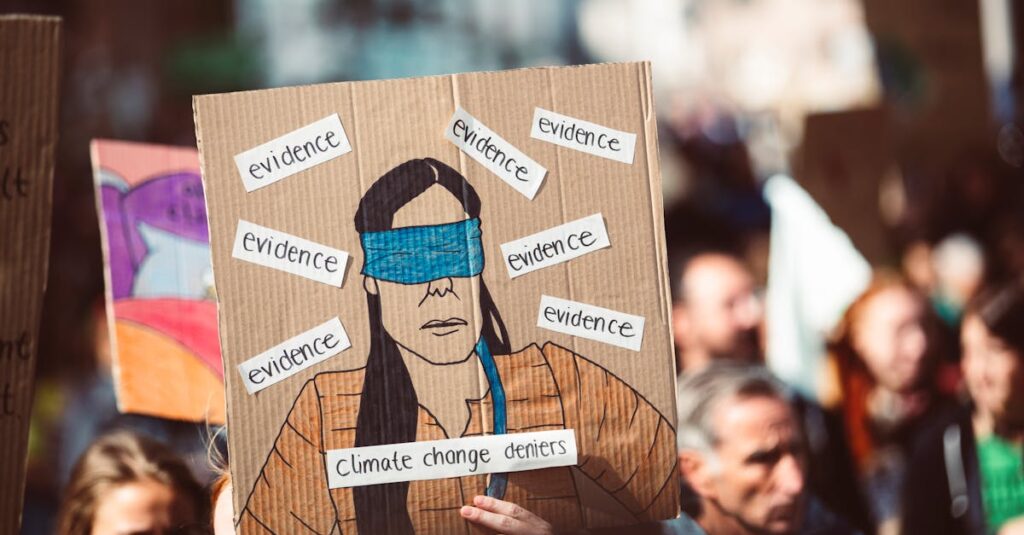Table of Contents
ToggleIn a world where politics can feel like a never-ending soap opera, understanding the key themes, actors, and issues is crucial. Global politics isn’t just for the experts; it’s for anyone who wants to navigate the wild ride of international affairs. From power struggles to diplomatic drama, this reader dives into the heart of global interactions, offering insights that are as enlightening as they are entertaining.
Imagine scrolling through the latest political headlines while sipping your morning coffee, and suddenly, you’re not just a bystander. You’re the armchair diplomat, armed with knowledge about the forces shaping our world. This article breaks down the complexities of global politics, making it accessible and engaging, so readers can join the conversation and maybe even impress their friends at the next dinner party.
Overview of Global Politics Reader
Global Politics Reader serves as a vital resource for anyone interested in understanding international affairs. It covers key themes such as sovereignty, globalization, and diplomacy, providing readers with essential concepts that shape current global interactions. Various actors, including nations, international organizations, and non-state entities, play significant roles in the political landscape, and this reader highlights their influence on global matters.
Important issues like climate change, human rights, and security challenges feature prominently in the content. The reader outlines how these topics interconnect with one another, demonstrating the complexity of global politics. Scholars, practitioners, and students benefit from these insights, gaining a broader perspective on contemporary challenges.
Additionally, case studies within the reader furnish real-world examples of political decisions and their implications. These examples enhance readers’ understanding of the decision-making processes that take place among various stakeholders. Data-driven analyses further enrich the content, providing quantitative insights to support qualitative discussions.
Inclusion of diverse viewpoints fosters critical thinking. Various opinions on contentious issues encourage readers to explore contrasting arguments. This approach not only enriches discussions but also cultivates informed debate.
Global Politics Reader is accessible online, making it easy for users to engage with the material at their convenience. Digital formats support a wide range of learning styles, accommodating different preferences for information consumption. By utilizing this reader, individuals can better navigate the intricate world of global politics and develop informed viewpoints on pressing issues affecting the international community.
Key Themes in Global Politics
Understanding key themes in global politics enhances comprehension of international affairs. Themes like power dynamics and globalization shape global interactions significantly.
Power Dynamics
Power dynamics define relationships between states, organizations, and actors in the international arena. Major powers often exert influence over smaller nations, affecting global stability. State sovereignty remains a critical concept as nations navigate their interests while balancing collaboration. As geopolitical tensions rise or decline, power shifts occur, reshaping alliances and rivalries. Historical events demonstrate the impact of power struggles, showcasing how decisions can alter global landscapes. Engaging with these dynamics allows individuals to better grasp the ongoing evolution of international relations.
Globalization and Interdependence
Globalization fosters interconnectedness among nations, transforming economies, cultures, and societies. Trade agreements illustrate how countries rely on one another for resources and markets. As information flows rapidly across borders, cultural exchanges become common, influencing public opinion and governance. This interdependence complicates issues such as climate change and public health, requiring coordinated responses. Adapting to globalization involves understanding its benefits and challenges, including inequality and cultural homogenization. Analyzing these factors reveals the multifaceted nature of modern global politics.
Major Actors in Global Politics
Understanding the major actors in global politics is crucial for grasping the dynamics of international relations. Key players influence global events, shaping policies and outcomes.
Nation-States
Nation-states serve as primary actors in global politics. They assert sovereignty, maintaining authority over defined territories and populations. Governments formulate policies reflecting national interests, including security and economic growth. Diplomatic relations established with other nations impact trade agreements and defense partnerships. During conflicts, nation-states often act in self-interest, striving to protect their citizens and resources. Historical events influence contemporary interactions, showcasing how alliances and rivalries shape global landscapes.
Non-State Actors
Non-state actors increasingly play significant roles in global affairs. These entities include international organizations, non-governmental organizations, and multinational corporations. They address issues like human rights, environmental protection, and economic development. Their influence often complements or challenges nation-state narratives, especially in addressing global challenges like climate change. Collaborations between non-state actors and governments can lead to innovative solutions. Additionally, grassroots organizations mobilize local communities, raising awareness and advocating for social change, demonstrating the diverse landscape of global politics.
Current Issues in Global Politics
Global politics faces critical issues that shape international relations and influence national policies. Two pressing concerns are climate change and human rights, both of which demand urgent attention and action.
Climate Change
Climate change presents a significant challenge for global politics, affecting economies and ecosystems across the world. Rising temperatures drive extreme weather events, placing pressure on governments to adapt. Nations frequently engage in negotiations to establish frameworks for reducing greenhouse gas emissions, with the Paris Agreement being a pivotal example. Collaboration among states offers potential solutions, yet resistance from certain countries complicates progress. Resilient strategies are essential to address these environmental challenges and mitigate their impacts on vulnerable populations.
Human Rights
Human rights issues remain a cornerstone of global political discourse, with various actors advocating for justice and equality. Violations continue to occur, prompting international scrutiny and condemnation. Global organizations, such as the United Nations, emphasize the protection of individual rights as fundamental to fostering peace and stability. Non-state actors, including NGOs, play vital roles in reporting abuses and raising awareness. Countries must prioritize human rights in their policies to create inclusive societies and uphold shared values in the face of ongoing challenges.
Understanding global politics is essential for anyone looking to engage with today’s complex world. The Global Politics Reader serves as a crucial tool for those seeking to navigate the intricate themes and actors shaping international relations. By exploring significant issues such as climate change and human rights, readers can grasp the interconnectedness of global challenges.
This resource not only enhances knowledge but also encourages critical thinking and informed debate. With its accessible format and diverse perspectives, it empowers individuals to participate meaningfully in discussions about the future of our world. Engaging with these themes is vital for fostering a more informed and active global citizenry.





